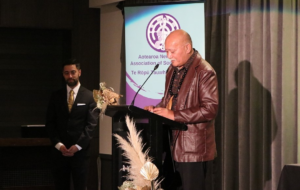
Huge congratulations to Okesene Faraimo who recently won the Quality Practice Award at the ANZASW Social Work Awards 2023. The SWRB sponsored the award as a valuable opportunity to celebrate and highlight quality professional practice.
Okesene delivers a social work in schools service as part of the Family and Community Services Team at Taeaomanino Trust. We interviewed him to find out more about his social work journey and the work which led to his being nominated for the Social Work Award.
Kia ora Okesene, please can you tell us a bit about your social work journey? Where did it start?
In the Islands
Being Pacific and growing up there, you are taught from a young age about respect and service, both in the family and at church. I was born in Sāmoa and then brought up by my grandparents in Tokelau. My parents sent for me when they were moving from Sāmoa to New Zealand when I was aged eight. It was hard at times when we moved. I was teased about my language and being different. This experience helps in the work I do now. I know what that struggle it like.
A job in the railways
After leaving school, I was originally in the railways. I ended up training in a process of the electrical trade – repairing and refurbishing electrical motors. Although the job was good, I didn’t really feel it was where I wanted to be.
Back to study
With the support of my wife, I went back to study – I was in my 40s. That was a bit a challenge having been out of the classroom setting for many years. So, I thank my tutors of my time at Whitireia, fellow students and my family for supporting me to complete the diploma.
What was your first social work role?
After finishing my diploma, I wasn’t sure where to start but thought it would be good to make more connections in my community in Cannons Creek. I decided to volunteer for the local foodbank. It turns out that their social worker had just left, so when the manager heard I was just starting out in social work she asked me if I would be interested in the role. I ended up working there for ten years, before my move to Taeomanino Trust.
During that time, I went on to complete my social work degree. I was able to attend the Wānanga o Aotearoa which was a great place to get more understanding about Māori culture.
What does your current work involve?
I work in three schools in Cannons Creek supporting students between years one and eight. It was good to be able to carry on working with whānua that I had got to know in my previous role.
I usually visit the three schools every day, and once a week will meet with SENCO to go through the list of children and see how they are doing, what progress is being made. It is also important to keep families informed. I meet with other professionals in the school such as the school nurses, attendance officers and learning coordinators, as well as our extended network in the community. We take a holistic approach and end up supporting whānua with their challenges, for example with housing, WINZ, transport for hospital appointments.
I am also sometimes asked by intermediate schools and colleges to continue to provide support for students I’ve worked with as they move through their education.
Congratulations again on the award. You were nominated for your creative and innovative approach and advocacy for the profession. Would you like to say a bit about that?
It was a shock to receive the email saying I’d been nominated. I cracked up! I thought it was some sort of practical joke to begin with – someone messing with my emails! It was such a nice surprise.
In terms of my approach to my work, I am based in a diverse community and there is no one size fits all way of doing things. You need flexibility in your approach and focus on the family’s journey as you journey with them. It’s important to understand their cultures, protocols and language and I remind myself that I don’t have all the answers. Collaboration and networking are a big help in the role.
Being grounded in my Christian faith, knowing my culture and being involved in my community has helped give me the confidence to support and engage with whānau.
Cultural concepts for example Fakaaloalo, Tamāmanu and Inati along with the learning from my study helps inform my practice around respectful relationship, caring and equity.
I have a respect for all the individuals in our diverse community and like to build meaningful and good relationships. When it comes to the children, I bring myself to their level. I become a bit of a kid with them.
What would you say to someone who is just starting out in social work?
I sometimes say to my clients that they could be an awesome social worker because of their life experience. There are other people going through the same struggles.
You need a heart for people and stay true to the values of social work. It’s all about people and for me personally, my faith is important for me.
You have to support people and let them guide you, don’t impose yourself on them. It’s their journey and you’re there with them with a paddle on their canoe, you are crew for a time. Then they can carry on their journey without your support.
Published 7 November 2023